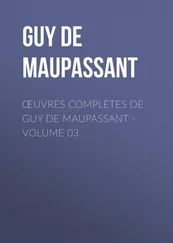Guy Maupassant - The works of Guy de Maupassant, Volume 5
Здесь есть возможность читать онлайн «Guy Maupassant - The works of Guy de Maupassant, Volume 5» — ознакомительный отрывок электронной книги совершенно бесплатно, а после прочтения отрывка купить полную версию. В некоторых случаях можно слушать аудио, скачать через торрент в формате fb2 и присутствует краткое содержание. Жанр: literature_19, foreign_antique, foreign_prose, на английском языке. Описание произведения, (предисловие) а так же отзывы посетителей доступны на портале библиотеки ЛибКат.
- Название:The works of Guy de Maupassant, Volume 5
- Автор:
- Жанр:
- Год:неизвестен
- ISBN:нет данных
- Рейтинг книги:3 / 5. Голосов: 1
-
Избранное:Добавить в избранное
- Отзывы:
-
Ваша оценка:
- 60
- 1
- 2
- 3
- 4
- 5
The works of Guy de Maupassant, Volume 5: краткое содержание, описание и аннотация
Предлагаем к чтению аннотацию, описание, краткое содержание или предисловие (зависит от того, что написал сам автор книги «The works of Guy de Maupassant, Volume 5»). Если вы не нашли необходимую информацию о книге — напишите в комментариях, мы постараемся отыскать её.
The works of Guy de Maupassant, Volume 5 — читать онлайн ознакомительный отрывок
Ниже представлен текст книги, разбитый по страницам. Система сохранения места последней прочитанной страницы, позволяет с удобством читать онлайн бесплатно книгу «The works of Guy de Maupassant, Volume 5», без необходимости каждый раз заново искать на чём Вы остановились. Поставьте закладку, и сможете в любой момент перейти на страницу, на которой закончили чтение.
Интервал:
Закладка:
UNE VIE
I
Jeanne, having finished her packing, went to the window, but it had not stopped raining.
All night long the downpour had pattered against the roofs and the window-panes. The low, heavy clouds seemed as though they had burst, and were emptying themselves on the world, to reduce it to a pulp and melt it as though it were a sugar-loaf. A hot wind swept by in gusts; the murmur of the overflowing gutters filled the empty streets, and the houses, like sponges, absorbed the moisture which, penetrating to the interior, made the walls wet from cellar to attic.
Jeanne, who had left the convent the day before, free at last and ready for all the happiness of a life of which she had dreamed for so long, feared that her father would hesitate about starting if the weather did not clear up, and, for the hundredth time since the morning, she studied the horizon.
Looking round, she saw that she had forgotten to put her almanac in her traveling bag. She took from the wall the little card which bore in the center of a design, the date of the current year 1819 in gilt letters, and crossed out with a pencil the first four columns, drawing a line through each saint's name till she came to the second of May, the day she had left the convent.
A voice outside the door called: "Jeannette!"
Jeanne answered: "Come in, papa." And her father appeared.
The Baron Simon-Jecques Le Perthuis des Vauds was a gentleman of the old school, eccentric and good-hearted. An enthusiastic follower of Jean-Jacques Rousseau, he had a loving tenderness for all nature; for the fields, the woods, and for animals. An aristocrat by birth, he hated '93 by instinct; but of a philosophical temperament and liberal by education, he loathed tyranny with an inoffensive and declamatory hatred. The strongest, and at the same time the weakest, trait in his character was his generosity; a generosity which had not enough arms to caress, to give, to embrace; the generosity of a creator which was utterly devoid of system, and to which he gave way with no attempt to resist his impulses, as though part of his will were paralyzed; it was a want of energy, and almost amounted to a vice.
A man of theories, he had thought out a whole plan of education for his daughter, wishing to make her happy and good, straightforward and affectionate. Till she was twelve years old she had stayed at home; then, in spite of her mother's tears, she was sent to the Sacred Heart Convent. He had kept her strictly immured there, totally ignorant of worldly things, for he wished her to return to him, at the age of seventeen, innocent, that he might himself immerse her in a sort of bath of rational poetry; and, in the fields, surrounded by the fertile earth, he meant to instruct her, and enlighten her by the sight of the serene laws of life, the innocent loves and the simple tenderness of the animals.
And now she was leaving the convent, radiant and brimful of happiness, ready for every joy and for all the charming adventures that, in the idle moments of her days and during the long nights, she had already pictured to herself.
She looked like a portrait by Veronese, with her shining, fair hair, which looked as though it had given part of its color to her skin, the creamy skin of a high-born girl, hardly tinted with pink and shaded by a soft velvety down, which could just be seen when she was kissed by a sun-ray. Her eyes were blue, an opaque blue, like the eyes of a Dutch china figure. On her left nostril was a little mole, another on the right side of her chin, where curled a few hairs so much like the color of the skin that they could hardly be seen. She was tall, with a well-developed chest and supple waist. Her clear voice sometimes sounded too shrill, but her merry laugh made everyone around her feel happy. She had a way of frequently putting both hands to her forehead, as though to smooth her hair.
She ran to her father, put her arms around his neck and kissed him.
"Well, are we going to start?" she asked.
He smiled, shook back his white hair, which he wore rather long, and pointing towards the window:
"How can you think of traveling in such weather?" he said.
Then she pleaded coaxingly and affectionately, "Oh, papa, please do let us start. It will be fine in the afternoon."
"But your mother will never consent to it."
"Oh, yes, I promise you she shall; I will answer for her."
"Well, if you can persuade your mother, I am quite willing to start."
She hastened towards the baroness's room, for she had looked forward to this day with great impatience. Since she had entered the convent she had not left Rouen, as her father would allow no distracting pleasures before the age he had fixed. Only twice had she been taken to Paris for a fortnight, but that was another town, and she longed for the country. Now she was going to spend the summer on their estate, Les Peuples, in an old family château built on the cliff near Yport; and she was looking forward to the boundless happiness of a free life beside the waves. And then it was understood that the manor was to be given to her, and that she was to live there always when she was married; and the rain which had been falling incessantly since the night before was the first real grief of her life.
In three minutes she came running out of her mother's room, crying:
"Papa! papa! Mamma is quite willing. Tell them to harness the horses."
The rain had not given over in the least, in fact, it was coming down still faster when the landau came round to the door. Jeanne was ready to jump in when the baroness came down the stairs, supported on one side by her husband, and on the other by a tall maid, whose frame was as strong and as well-knit as a boy's. She was a Normandy girl from Caux, and looked at least twenty years old, though she really was scarcely eighteen. In the baron's family she was treated somewhat like a second daughter, for she was Jeanne's foster-sister. She was named Rosalie, and her principal duty consisted in aiding her mistress to walk, for, within the last few years, the baroness had attained an enormous size, owing to an hypertrophy of the heart, of which she was always complaining.
Breathing very hard, the baroness reached the steps of the old hotel; there she stopped to look at the court-yard where the water was streaming down, and murmured:
"Really, it is not prudent."
Her husband answered with a smile:
"It was you who wished it, Madame Adélaïde."
She bore the pompous name of Adélaïde, and he always prefaced it by "Madame" with a certain little look of mock-respect.
She began to move forward again, and with difficulty got into the carriage, all the springs of which bent under her weight. The baron sat by her side, and Jeanne and Rosalie took their places with their backs to the horses. Ludivine, the cook, brought a bundle of rugs, which were thrown over their knees, and two baskets, which were pushed under their legs; then she climbed up beside old Simon and enveloped herself in a great rug, which covered her entirely. The concierge and his wife came to shut the gate and wish them good-bye, and after some parting instructions about the baggage, which was to follow in a cart, the carriage started.
Old Simon, the coachman, with his head held down and his back bent under the rain, could hardly be seen in his three-caped coat; and the moaning wind rattled against the windows and swept the rain along the road.
The horses trotted briskly down to the quay, passed the row of big ships, whose masts and yards and ropes stood out against the gray sky like bare trees, and entered the long Boulevard du Mont Riboudet. Soon they reached the country, and from time to time the outline of a weeping-willow, with its branches hanging in a corpse-like inertness, could be vaguely seen through the watery mist. The horses' shoes clattered on the road; and the four wheels made regular rings of mud.
Читать дальшеИнтервал:
Закладка:
Похожие книги на «The works of Guy de Maupassant, Volume 5»
Представляем Вашему вниманию похожие книги на «The works of Guy de Maupassant, Volume 5» списком для выбора. Мы отобрали схожую по названию и смыслу литературу в надежде предоставить читателям больше вариантов отыскать новые, интересные, ещё непрочитанные произведения.
Обсуждение, отзывы о книге «The works of Guy de Maupassant, Volume 5» и просто собственные мнения читателей. Оставьте ваши комментарии, напишите, что Вы думаете о произведении, его смысле или главных героях. Укажите что конкретно понравилось, а что нет, и почему Вы так считаете.












